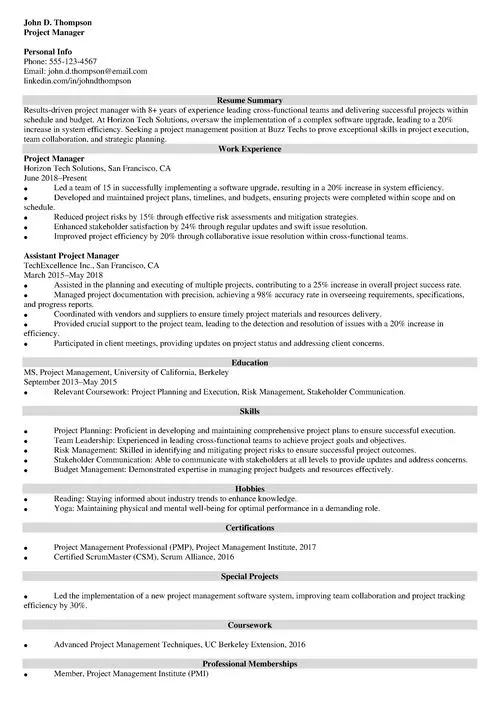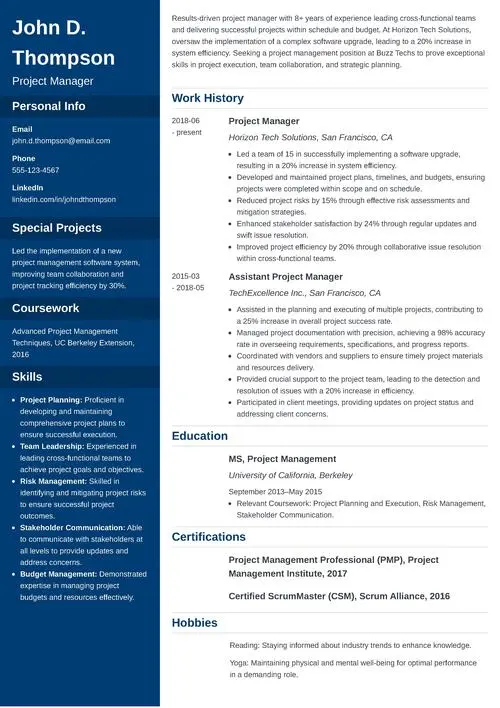20 Project Management Skills for Your Career & Resume
Create Your Resume NowProject managers are the leaders of progress, expert collaborators, and innovation champions. But what differentiates an average project manager from an exceptional one? It’s the ideal balance of technical proficiency and soft skills.
In this article, you’ll uncover the essential toolkit that makes up a good project manager. You’ll also know how to best showcase your project management skills on a resume for maximum impact.
This guide will show you:
- What are project manager skills & why employers value them.
- 20 hard and soft project management skills for a resume.
- How to include project manager skills on a resume.
- How to grow the skills needed for project management.
Want to save time and have your resume ready in 5 minutes? Try our resume builder. It’s fast and easy to use. Plus, you’ll get ready-made content to add with one click. See 20+ resume templates and create your resume here.
Sample resume made with our builder—See more resume examples here.
Did you get stuck on your resume project? See these guides to unlock the flow state:
- Assistant Project Manager Resume
- Product Manager Resume
- Product Marketing Manager Resume
- Program Coordinator Resume
- Program Manager Resume
- Project Manager Resume
- Senior Project Manager Resume
- Technical Program Manager Resume
What Are Project Management Skills?
Project management skills encompass diverse hard and soft abilities that enable professionals to develop project plans and foster a productive team environment. Employers value these skills as they contribute to successful project delivery, effective team management, and remarkable achievements.
Project management skills are awesome, especially when combined with other great skills. We analyzed 11 million resumes made in our builder, and we found what are the top 10 most commonly added skills by our users (PM skills included):
- Teamwork and Collaboration
- Problem-solving
- Excellent Communication
- Multitasking
- Attention to Detail
- MS Office
- Analytical and Critical Thinking
- Data Entry
- Project Management
- Team Management
Top 10 Hard Project Manager Skills
As a project manager, you need a toolbox of hard skills that’s more reliable than the office coffee machine. Such technical powers aren’t just for display-they are the driving forces that propel your projects to completion.
Here are the 10 hard skills required for a project manager that constitute a strong candidate profile:
1. Budget Management
Mastery of budget management is crucial for project managers to ensure that financial resources are allocated wisely, costs are under control, and projects align with the budgetary objectives. Situations where this skill is used include:
- Creating and monitoring project budgets.
- Determining cost-saving opportunities.
- Negotiating with vendors for optimal solutions.
2. Risk Assessment and Management
Identifying, assessing, and mitigating risks is vital to proactively address potential issues before they impact project timelines and outcomes. Project managers are expected to showcase these abilities when:
- Conducting risk analysis and implementing risk management plans.
- Deploying backup plans to address potential risks.
- Communicating risk assessments to stakeholders and team members.
3. Project Scheduling and Planning
Expertise in preparing project schedules and plans brings a sense of calm as tasks flow smoothly, ensuring on-time delivery and successful project completion. Here’s where project scheduling comes in handy:
- Developing project schedules and Gantt charts.
- Allocating resources effectively to adhere to project deadlines.
- Adjusting project schedules to accommodate changes or delays.
4. Quality Management
Maintaining high-quality standards throughout a project's lifecycle is crucial for delivering products and services that meet the demands of stakeholders. Situations where a project manager demonstrates such skills include:
- Establishing quality control processes.
- Conducting quality assurance checks and audits.
- Implementing improvement initiatives to improve quality standards.
5. Technical Proficiency
A solid grasp of technical tools and platforms relevant to the project field is key for effective communication, data management, and problem-solving. Hardly any project manager can perform the following duties without technical proficiency:
- Utilizing project management software for task tracking and reporting.
- Exploiting data analysis tools for performance measurement.
- Collaborating with technical teams to meet complex project requirements.
6. Resource Management
Resource management proficiency involves allocating, tracking, and optimizing resources (e.g., staff, materials, and equipment) to ensure project tasks are executed efficiently and within budget. Consider resource management skills for:
- Optimizing resource utilization to meet project objectives.
- Resolving resource conflicts or possible shortages.
- Identifying opportunities for resource cost reduction.
7. Change Management
Change control is the ability to lead and navigate through organizational transformations, ensuring minimal disruption while enhancing the benefits of change initiatives. Here are the concrete instances of when change management skills are inevitable:
- Communicating transformation strategies to team members and stakeholders.
- Implementing change management processes to diminish resistance.
- Adapting project plans to accommodate evolving requirements.
8. Stakeholder Management
Proficiency in stakeholder management refers to identifying, engaging, and satisfying the needs of various project stakeholders, which, in the long run, help to pursue project goals. Project managers need these abilities, particularly in these situations:
- Building strong relationships with project sponsors, clients, and key stakeholders.
- Addressing stakeholder expectations and managing communication.
- Taking care of stakeholder concerns and conflicts effectively.
9. Procurement and Contract Management
The ability to oversee procurement processes, negotiate contracts, and manage vendor relationships helps to secure necessary goods and services for project execution. Project managers use this skill for:
- Developing procurement strategies and sourcing vendors.
- Negotiating advantageous contract terms and conditions.
- Ensuring compliance with procurement policies and regulations.
10. Reporting and Documentation
Being well-oriented in managing project documents and reports, like status updates or performance metrics, helps make smart decisions and keeps the project transparent. That’s why project managers can’t do without documentation skills, especially when:
- Generating project progress reports for stakeholders and management.
- Documenting project risks, issues, and resolutions.
- Ensuring compliance with documentation standards and regulatory requirements.
Top 10 Soft Project Manager Skills
While technical expertise is the superhero cape of project managers, soft skills give them the charm of a diplomat. These skills not only drive successful project outcomes but also nurture collaborative teams and contribute to successful relationships with stakeholders. See the essential soft skills needed to be a project manager:
11. Communication
Effective communication lies at the core of efficient project management. If you’re good at it, you can articulate your ideas clearly, actively listen to your team members, and adapt different communication styles to get along with diverse stakeholders. Situations where this skill is commonly used include:
- Presenting project plans and updates to stakeholders.
- Resolving conflicts and misunderstandings within the project team.
- Crafting persuasive messages to align team members with project goals.
12. Leadership
Exceptional project managers inspire and motivate their teams, boosting their confidence and guiding them toward shared objectives. They lead by example, empower team members, and help create an environment of trust and collaboration. These are a few examples of when leadership skills are of key importance:
- Motivating team members during challenging project stages.
- Providing clear direction and guidance in ambiguous situations.
- Developing future leaders within the project team.
13. Adaptability
Good adaptability skills make project managers adjust to changing circumstances easily, embrace innovation, and take on new project strategies in response to changing requirements or different challenges. Situations where adaptability plays the primary role include:
- Adapting project timelines and resource allocations due to unforeseen obstacles.
- Embracing new technologies or methodologies to improve project efficiency.
- Navigating changes in project scope or priorities.
14. Problem-Solving
Project managers adept in problem-solving possess the capacity to analyze complex issues and identify optimal resolutions while considering the overall project impact.
The single most important skill for project managers nowadays? Problem-solving. By being able to use tools to lead groups through problem-solving sessions, you'll have a valuable skill that can be used in any situation. This is true whether your team follows waterfall or Agile. And with organizations needing to work more efficiently than ever, you'll be able to help your team identify ways to make improvements through your problem-solving skills.
Here’s when problem-solving skills appear the most useful:
- Addressing unforeseen risks that may impact project delivery.
- Resolving conflicts between team members or stakeholders.
- Innovating to overcome project-related hurdles.
15. Emotional Intelligence
Emotional intelligence is a keen awareness of one's emotions and the emotions of others. Highly developed emotional intelligence helps maintain successful interpersonal relationships, cultivates empathy, and enables smooth conflict resolution. If you’re a project manager, you likely use emotional intelligence for:
- Understanding and addressing team members' emotional responses to project challenges.
- Handling sensitive conversations and negotiations with stakeholders.
- Fostering a supportive and inclusive project team culture.
16. Time Management
Project managers with strong time management skills excel in prioritizing tasks, optimizing schedules, and ensuring efficient utilization of resources to comply with project deadlines. Consider growing your time management skills for:
- Allocating resources effectively to meet project milestones.
- Managing tight project timelines and dependencies.
- Minimizing project delays through effective time management.
17. Conflict Resolution
Navigating and resolving conflicts within the project team or among stakeholders reinforces collaboration and mutual understanding. Conflict resolution skills can be utilized through:
- Mediating conflicts between team members to maintain productivity.
- Addressing difficulties arising from differing stakeholder expectations.
- Implementing strategies to prevent recurring conflicts.
18. Negotiation
Proficient project managers excel in negotiation, balancing stakeholders' demands and securing agreements to advance project objectives. Here’s when this skill is particularly important:
- Negotiating project timelines and deliverables with clients or external partners.
- Resolving resource allocation conflicts within the project team.
- Securing budget and resource approvals from organizational leadership.
19. Team Building
If you possess team-building skills, you have the capacity to create, nurture, and lead high-performing project teams and promote a culture of inclusivity and collaboration. The team building skills are essential when:
- Building cross-functional project teams with distinct skill sets.
- Cultivating a sense of fellowship and shared purpose among team members.
- Developing mentorship and knowledge-sharing initiatives within the project team.
20. Stakeholder Management
Stakeholder management is the proficiency in engaging, influencing, and maintaining positive relationships with project stakeholders, clients, team members, and external partners. You can use this skill when:
- Aligning stakeholder expectations with project deliverables.
- Managing communications with stakeholders to ensure transparency and consensus.
- Resolving conflicts and addressing concerns among stakeholders to maintain project momentum.
Pro Tip: When incorporating soft skills on your project manager resume, provide concrete examples of situations where they positively impacted project outcomes.
Making a resume with our builder is incredibly simple. Follow our step-by-step guide, use ready-made content tailored to your job and have a resume ready in minutes.
When you’re done, Zety’s resume builder will score your resume and our resume checker will tell you exactly how to make it better.
How to Incorporate Project Management Skills into Your Resume?
If you’re writing a project manager resume, approach it as if you were embarking on a new project. First, define your goals and an employer’s expectations. Then, identify risks and establish a clear strategy for highlighting your project manager's prowess.
Here are a few tips that might help you display your project manager skills the most effectively:
- Craft a compelling resume summary, underlining your project management proficiency and emphasizing your leadership and problem-solving abilities.
- Integrate your project manager skills within the descriptions of your previous work experience; showcase excellent communication, adaptability in managing complex projects, and negotiation abilities.
- Highlight your professional achievements or projects where your project manager skills were instrumental in driving success.
- Dedicate the prominent skills section to list your soft and hard skills; outline crucial competencies such as stakeholder management, budgeting, Agile methodologies, risk assessment, etc.
- Include any relevant certifications or specialized training that reinforces your project management expertise, demonstrating your commitment to professional development.
Pro Tip: Tailor your resume to the specific job description, emphasizing the project manager skills most relevant to your chosen role. This enhances your resume's resonance with potential employers, showcasing how your skills address their needs and objectives.
How to Improve Project Manager Skills?
Building up your project manager skills is like fine-tuning an engine—blending expertise, hands-on experience, and a dash of innovation. As project management becomes increasingly competitive, honing your skills isn’t a choice—it's a necessity. Here’s how you can elevate your project manager prowess:
Embrace Continuous Learning and Professional Development
Engage in relevant courses and training opportunities. Platforms like Coursera offer numerous training possibilities, helping you master your project management abilities. Moreover, consider pursuing certifications such as PMP (Project Management Professional) or PRINCE2 to solidify your expertise and credibility within the field.
Utilize Mentorship and Networking
Seek mentorship opportunities within the project management community to benefit from seasoned professionals. Join industry-specific networking groups and workshops and participate in webinars to gain diverse perspectives and invaluable advice.
Gain Hands-On Project Experience
Look for challenging projects or volunteer for leadership roles within your current organizational framework. Hands-on experience enables you to test your theoretical knowledge but also cultivates resilience, adaptability, and innovative approach.
Get Feedback and Practice Self-Reflection
Cultivate a continuous improvement mindset by actively seeking feedback from peers, supervisors, and team members. Embrace self-reflection as a critical component of skill refinement. And finally, identify areas for growth to refine your communication and leadership style.
Pro Tip: By choosing a multidimensional approach to skill enhancement, you can pave the way for the ongoing development of your project manager skills. Try a combination of formal education, first-hand experience, workshops, conferences, and mentorship opportunities.
Plus, a great cover letter that matches your resume will give you an advantage over other candidates. You can write it in our cover letter builder here. Here's what it may look like:
See more cover letter templates and start writing.
Thank you for reading this article about project manager skills. I hope you will find it helpful when showcasing your project manager expertise on a resume. If you have any questions, please leave your note in the comment section.
About Zety’s Editorial Process
This article has been reviewed by our editorial team to make sure it follows Zety's editorial guidelines. We’re committed to sharing our expertise and giving you trustworthy career advice tailored to your needs. High-quality content is what brings over 40 million readers to our site every year. But we don't stop there. Our team conducts original research to understand the job market better, and we pride ourselves on being quoted by top universities and prime media outlets from around the world.




